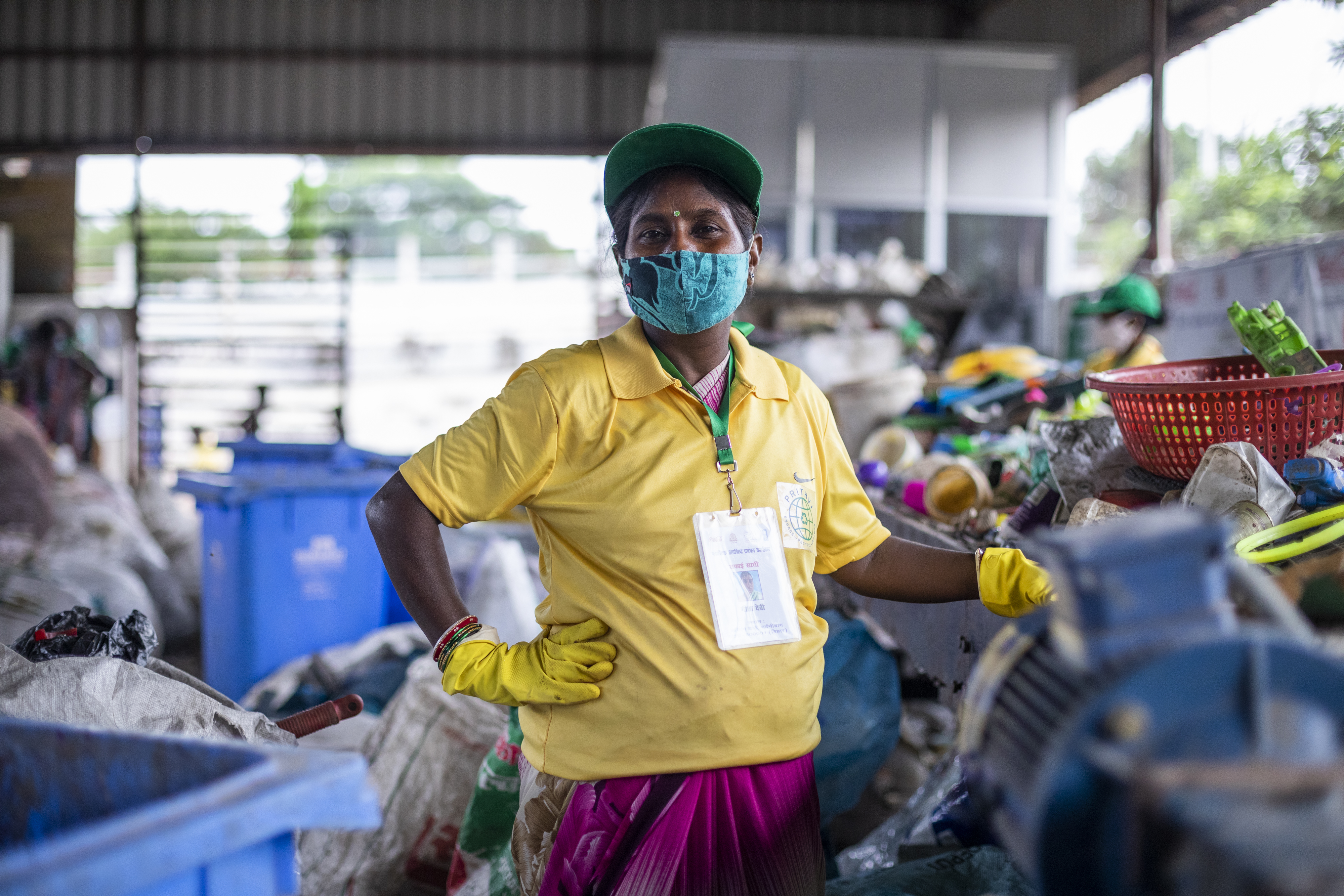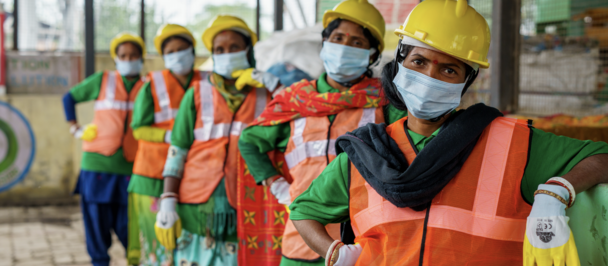The report identifies certain key areas for improvement to promote social empowerment of Safai Sathis
UNDP releases first-of-its-kind assessment of the socio-economic status of waste pickers in India
January 25, 2022
Safai Sathi at a Material Recovery Facility. Photo Credit: Gaurav Menghaney/UNDP India
New Delhi, 25 January 2022: United Nations Development Programme (UNDP) India today released a Baseline analysis of the socio-economic situation of Safai Sathis or waste pickers. The analysis is one of the first large-scale assessments conducted in India, covering 9,300 Safai Sathis in 14 cities, and was released by Mr. Amitabh Kant, CEO, NITI Aayog.
The launch was joined by Ms. Yogita Swaroop, Senior Economic Advisor, Ministry of Social Justice & Empowerment (MoSJE); Mr. Shingo Miyamoto, Minister - Economic & Development, Embassy of Japan; Ms. Shoko Noda Resident Representative, UNDP India; Mr. Atul Bagai, Head of Country Office, UNEP; and Ms. Prabha Narasimhan Executive Director - Home Care, Hindustan Unilever.
“Safai Sathis, or waste pickers are the invisible environmentalists, and play a significant role in waste recycling in India. The social inclusion of informal workers is crucial for sustainable plastic waste management. I am hopeful that the findings from this baseline analysis will help address the vulnerabilities of waste pickers. NITI Aayog is happy to support UNDP and nodal ministries such as the Ministry of Housing and Urban Affairs and MoSJE in the process of enhancing the resilience of the waste pickers in the country,” said Mr. Amitabh Kant, CEO, NITI Aayog.
The Baseline was undertaken as part of Project ‘Utthaan – Rise with Resilience’ under UNDP’s Plastic Waste Management Programme. Utthaan is UNDP India’s COVID-19 response enabling Safai Sathis to access government schemes and build more resilient communities.
The Baseline had an equal representation of male and female Safai Sathis and found that the work undertaken by them is highly informal, which restricts income and job mobility: Some of the key findings included:
- 6 out of 10 Safai Sathis reported having a bank account
- 21 percent of the Safai Sathis reported access to Jan Dhan Yojana, with an even lower proportion indicating access and use of digital payment methods
- Except for Aadhar and voter cards – ownership of which was reported by more than 90 percent and 60 percent Safai Sathis, respectively– all other forms of identification such as birth, income, caste, and occupation certificates were found to be severely lacking across the community
- 50 percent of the Safai Sathi reported owning and using a ration card
- Health insurance coverage among Safai Sathis was below 5 percent
- Temporary sheds and rented housing were reported as the most common forms of accommodation
- More than 90 percent of Safai Sathis reported having a continuous drinking water supply, while 80 percent had an electricity supply
- Access and use of sanitation facilities were reported only by 60 percent of Safai Sathis
- Wood-based fuels for cooking were recorded at par with cleaner alternatives
In 2021, UNDP also launched the first-ever Social Protection Facilitation Centre in Goa with the support of Embassy of Japan to boost access to social protection for Safai Sathis. The Centre acts as a crucial bridge between the government departments operating social protection schemes and Safai Sathis.
“Japan is delighted to support initiatives that empower informal workers to obtain adequate social support, as well as reduce, reuse, and recycle plastic waste. Our support to project Utthaan reflects this commitment. I hope with access to government schemes and social inclusion, Safai Sathis can better realize improvement in their financial and health status," said Mr. Shingo Miyamoto, Minister - Economic & Development, Embassy of Japan.
“Safai Sathis play a key role in plastic recycling. With the findings and evidence from UNDP’s first-ever comprehensive analysis on the socio-economic status of the Safai Sathis, we will work with the urban local bodies and government departments to build programmes and outreach that have a meaningful impact in the lives of Safai Sathis,” said Ms. Shoko Noda, Resident Representative, UNDP India.
The Baseline also identified certain key areas for improvement to promote social empowerment of the Safai Sathis. The four broad policy recommendations include:
- Formulation of a welfare framework to design social protection schemes for Safai Sathis.
- Strengthening and formalizing the economic contributions of this community.
- Initiating skilling programmes and exploring alternate livelihood opportunities.
- Expanding and increasing the uptake of social safety nets among the Safai Sathis.
At the launch, Hindustan Unilever also announced its support to the next phase of Utthaan, reaching 3,000 Safai Sathis in Delhi and Mumbai with access to government schemes. Hindustan Unilever is already supporting UNDP's efforts to manage and process plastic waste in Mumbai by setting up 4 Swachhta Kendras and reaching 75,000 households.
UNDP's plastic waste management programme is currently operational in 35 cities, partnering with corporates and urban local bodies for sustainable waste management practices. The plastic collected and processed so far has already crossed 83,000 metric tonnes. The project has reached out to 5,000 Safai Sathis to institutionalize workers from the informal sector through these centers.
Link to the complete report: https://www.in.undp.org/content/india/en/home/library/poverty/Baseline_analysis_of_the_socio-economic_situation_of_Safai_Sathis.html
About UNDP India
UNDP works across 170 countries and territories to eradicate poverty while protecting the planet. We help countries develop strong policies, skills, partnerships, and institutions so they can sustain their progress. UNDP has worked in India since 1951 in almost all areas of human development, from systems strengthening to inclusive growth and sustainable livelihoods, as well as sustainable energy, environment, and resilience. UNDP’s programmes continue to integrate a global vision for catalytic change with India’s national priorities. With over 30 projects on the ground in almost every state, today, it works to achieve the Sustainable Development Goals by transforming traditional models to do development differently.
For more information, please visit https://www.in.undp.org/
Follow UNDP India on Twitter, Facebook, Instagram, and LinkedIn.
For more information, please contact:
UNDP India
Charu Sethi
Head of Communications and Partnerships, UNDP India
charu.sethi@undp.org
Ankita Bhalla
Communications Officer, Plastic Waste Management Programme, UNDP India

 Locations
Locations



